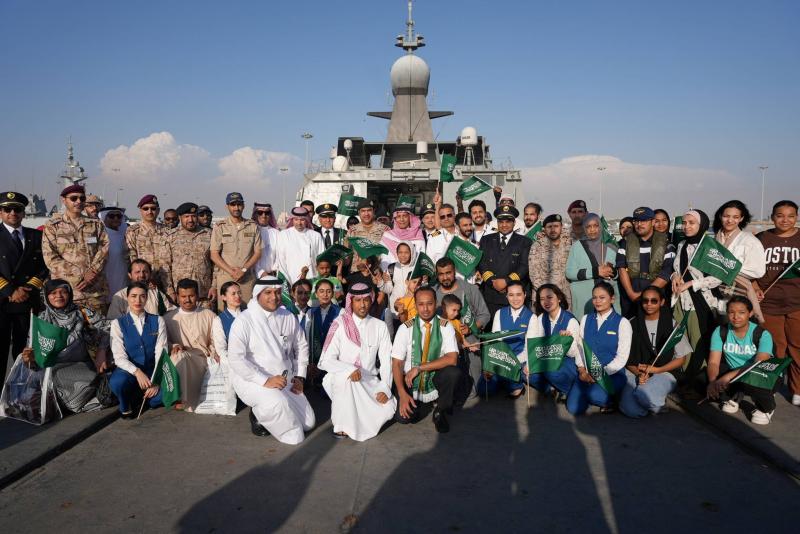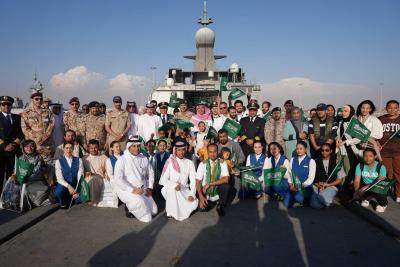As fighting continues between two rival military factions in Sudan's capital, Khartoum, people are attempting to escape the chaos. Numerous Arab and foreign countries have rushed to dispatch aircraft and organize convoys to transport their nationals to safety.
The efforts to evacuate foreign nationals from Sudan have frustrated some Sudanese citizens who feel that the Sudanese army and Rapid Support Forces have not shown sufficient concern for their safety. The Rapid Support Forces stated in a statement that they are working to "provide essential services to citizens, secure sources of these services, and ensure that employees can perform their duties, in addition to facilitating the evacuation of diplomatic missions and foreign nationals, along with securing roads and helping citizens reach safe areas."
The first German Air Force plane, carrying 101 evacuees from Sudan, landed in Berlin early on Monday. The Airbus A321 transported these individuals from the Jordanian al-Azraq base, which the German army uses as an evacuation center. A source told Reuters that the German army has evacuated 313 people from Sudan so far. Japan will send an evacuation team from Djibouti to Sudan once preparations are completed, according to Japan's Chief Cabinet Secretary.
Italy has evacuated 96 people by air from Sudan, where Western, Arab, and Asian countries are hastening to get their citizens out since the outbreak of violence. Two military aircraft transported 83 Italians and 13 nationals from various countries, all of whom were evacuated from Khartoum to Djibouti from where the planes took off.
The Egyptian Foreign Ministry announced the death of the assistant administrative attaché at the Egyptian embassy in Khartoum and denied reports that the deceased was the assistant military attaché, as stated in a previous military statement. The Sudanese army has claimed that "the assistant military attaché was killed by Rapid Support Forces' fire while driving in Khartoum." In response, the Rapid Support Forces accused the military of spreading lies.
German Foreign Minister Annalena Baerbock stated that "more than 300 people have been evacuated from Sudan by air as of this morning," specifying that this number includes citizens from Germany, the UK, Austria, Belgium, the USA, and others. She noted the intention to find ways to evacuate remaining Germans still in Sudan, including possible maritime evacuation.
A French warship is heading to Port Sudan to assist in the evacuation of those leaving Sudan, as Western evacuation efforts escalate. An American source remarked that "convoys trying to leave are facing problems, including robbery and looting."
Josep Borrell, the European Union's foreign policy chief, confirmed that the EU ambassador remains in Sudan but not in Khartoum, stating, "the captain is the last to leave the ship." He emphasized the necessity to continue pushing for a political resolution in Sudan, cautioning that allowing the situation to deteriorate could send shockwaves throughout Africa.
The French government has noted it is continuing to evacuate individuals from Sudan, mentioning another evacuation operation taking place on Monday morning. France has thus far evacuated 388 people. The Danish Foreign Ministry reported the evacuation of 15 citizens from Sudan last night, facilitated by France, while 11 Polish nationals, including the Polish ambassador, were evacuated successfully by France and Spain.
The Sudanese army and Rapid Support Forces exchanged accusations regarding the attack on a French convoy, with both sides reporting that a French national was injured. The Dutch Foreign Ministry revealed that a Dutch military aircraft carrying evacuees has left Sudan for Jordan early on Monday, with passengers from various nationalities onboard.
China's Foreign Ministry reported that it has sent a mission to Sudan and successfully evacuated a group of individuals to a neighboring country. Sweden announced the successful evacuation of all its embassy staff in Khartoum and their families to Djibouti, noting military planes would continue assisting in the evacuation of foreigners as long as the security situation allows.
Switzerland closed its embassy in Khartoum and evacuated its staff and their families due to the current security situation. The statement on Twitter indicated that this was accomplished through cooperation with partners, especially France, without disclosing how many were evacuated.
The Lebanese Foreign Ministry confirmed the evacuation of 52 individuals who were transferred early Monday from Port Sudan on a Saudi navy ship heading to Jeddah.
The U.S. Agency for International Development also announced that it has deployed a disaster response team to coordinate humanitarian assistance in Sudan amid ongoing fighting, with plans to work from Kenya in the initial stage to identify and address priority needs safely alongside international partners.
The Sudanese army announced collaboration with the USA, UK, Germany, and France for evacuations from Wadi Seidna airbase north of Khartoum, with evacuations for Qatari and Jordanian nationals carried out overland to Port Sudan.
The risks have been highlighted by the army's accusations against the Rapid Support Forces for looting a Qatari convoy en route to Port Sudan. The violence that erupted on April 15, four years after the overthrow of Omar al-Bashir, is worsened by reports of violence surpassing the worst seen in Darfur, an area plagued by conflict since 2003 that has resulted in the deaths of 300,000 people and the displacement of 2.7 million.
The Sudanese army, led by General Abd al-Fattah al-Burhan, and the Rapid Support Forces, led by General Mohamed Hamdan Dagalo (Hemedti), have intermittently agreed on ceasefire negotiations since the outbreak of fighting, including a three-day truce during Eid al-Fitr that started on Friday.
For the first time since the fighting began, Hemedti appeared in a short video, wearing his military uniform and sitting in the passenger seat of a pickup truck surrounded by cheering forces near the presidential palace in Khartoum.




